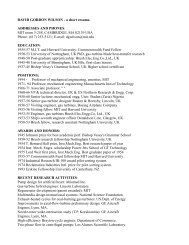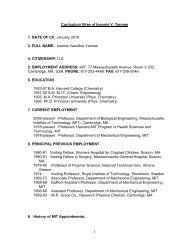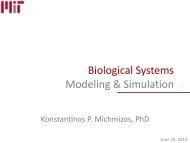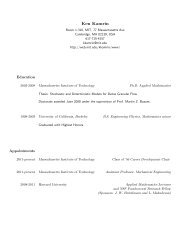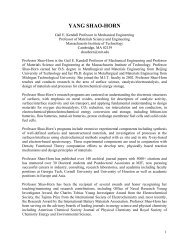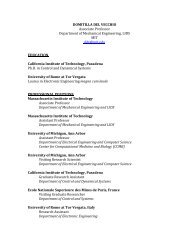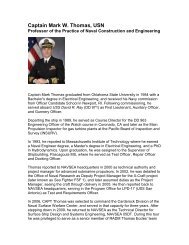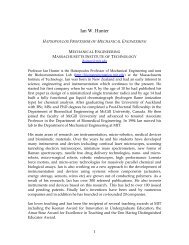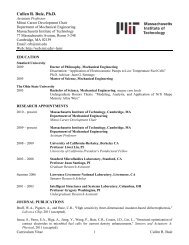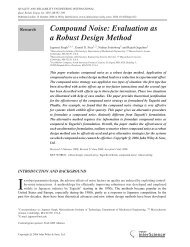Guide To Graduate Study In Mechanical Engineering - MIT
Guide To Graduate Study In Mechanical Engineering - MIT
Guide To Graduate Study In Mechanical Engineering - MIT
You also want an ePaper? Increase the reach of your titles
YUMPU automatically turns print PDFs into web optimized ePapers that Google loves.
• Heat and Mass Transfer (2.52 or 2.55)<br />
• System Dynamics and Control (2.140 and 2.151) or Signal Processing<br />
(6.003) or Probability and Random Processes (6.431 and 2.22)<br />
• Biological <strong>Engineering</strong> (2.795J and 2.798J)<br />
• Optics (2.710)<br />
• Manufacturing (2.810)<br />
• Design (2.744, 2.75, 2.739) or <strong>Mechanical</strong> Elements and Systems Design<br />
(2.75)<br />
• Micro and Nano Systems (2.37)<br />
2. A Research Presentation<br />
Both the list of subjects and the format of each subject exam undergo some metamorphosis: New<br />
subjects may be made available with one term’s advance notice; existing subjects may be<br />
discontinued, but only upon at least two years’ notice.<br />
The thesis-area examination is currently a forty-five-minute exam in which the candidate<br />
presents and is questioned on his/her own original research, such as a previously completed SM<br />
thesis or initial work toward the doctoral thesis.<br />
The <strong>Mechanical</strong> <strong>Engineering</strong> Faculty as a whole review each student's performance in the<br />
qualifying examinations and make decisions regarding passing, being allowed to repeat the<br />
exams, or failing. Candidates who are permitted to repeat the exams must do so the next time<br />
they are offered. <strong>In</strong> no case is a candidate allowed to repeat more than once.<br />
Major. The major is a program of advanced study which gives the candidate both depth and<br />
breadth in a field of engineering or science approved by the departmental <strong>Graduate</strong> Committee.<br />
Examples are: (i) Mechanics; (ii) Product Realization; (iii) Controls, Robotics and<br />
<strong>In</strong>strumentation; (iv) Energy Science and <strong>Engineering</strong>; (v) Ocean Science and <strong>Engineering</strong>; (vi)<br />
Biomechanics and <strong>Engineering</strong>; (vii) Micro/Nanomechanics and <strong>Engineering</strong>. The <strong>Graduate</strong><br />
Officer may approve appropriate alternatives.<br />
The set of major subjects should bring candidates to the state of the art in their chosen field,<br />
insofar as that is possible via coursework. These subjects are typically H-level. Candidates must<br />
satisfy their Doctoral Committee and the <strong>Graduate</strong> Officer that their proposed program meets this<br />
intent. The major represents the principal component of the candidate's coursework.<br />
The program of study comprised of the major, minor, and additional supporting subjects will<br />
typically consist of at least 144 credit units (12 subjects). Advanced subjects taken toward a<br />
Master's degree may be used to satisfy the requirements of the doctorate. Advanced subjects<br />
taken at another graduate school may also be counted toward the <strong>MIT</strong> doctorate, if approved by<br />
both the <strong>Graduate</strong> Officer and the candidate's thesis committee. The limit is 72 credit units if the<br />
subjects were taken outside <strong>MIT</strong>.<br />
Minor. The minor is a program of advanced study that develops competence in an area different<br />
from the candidate's principal field of interest. Three subjects (not less than 24 units) must be<br />
taken in a coherent field different from the major. These subjects may be taken inside or outside<br />
the department. For example, a student whose thesis is in Mechanics may propose a minor in<br />
Product Realization, or Biomechanics and <strong>Engineering</strong>, etc. and take all or most of the subjects<br />
within the department.<br />
12



